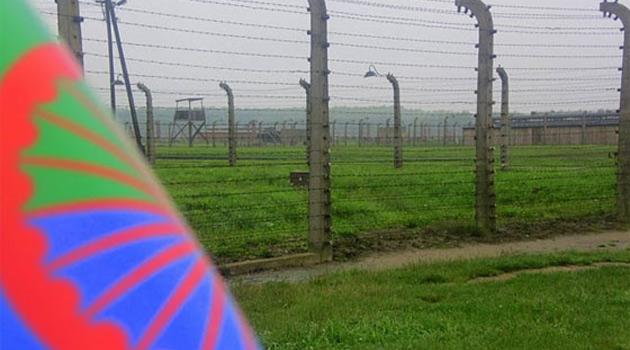This year’s anniversary of the liberation of Auschwitz seemed like a delayed whipping up of a call to arms. The alarm was sounded without a clear enemy.
The tribute to the victims of Nazi genocide was carried through the ether without mentioning all of the victims concerned. Essentially, it was a loose sequel to the selective approach toward human rights we have been experiencing as our societal atmosphere continues to deteriorate.
The anniversary of the liberation of Auschwitz is understandably about the Jews and their suffering because the Nazis chose them for targeted destruction. As several of the speakers correctly reminded us at the "Let My People Live!" conference in Prague, we must never forget the Nazi terror and its victims or history will repeat itself.
What about the other victims?
This otherwise banal message, which has been proven many times throughout history, takes on a different aspect when we realize that the other victims who were also chosen by the Nazis for targeted murder were mentioned by almost no one this year. There was silence, more or less, about the mentally and physically disabled people, the Roma, and the sexual minorities who also went through the gas chambers at Auschwitz.
In the media in general, at the Prague conference, in society, on television, there were only exceptional mentions made of these other victims. "The date of 27 January, which is Holocaust Remembrance Day, commemorates the liberation of the concentration and extermination camp of Auschwitz, where various groups of people suffered and died. In their suffering, all victims of Nazi murder are equal, so the Romani victims should also be remembered in a dignified way on 27 January, and not just at Terezín," historian Michal Schuster of the Museum of Romani Culture told news server Romea.cz last week.
Film director Břetislav Rychlík, who created the documentary film "Oh, You Black Bird: The Forgotten Holocaust of the Romanies", said "It is good to remember the Romani victims together with the Jewish ones. The strong animosity felt against Romani people here means people do their best to question whether the Romani Holocaust even happened. Some online discussants even welcome the idea. In this atmosphere, it is very important to remember the full extent of the Holocaust."
Our society is not able to remember all of the victims of the Holocaust together. It basically never occurs to anyone to do so.
Prejudice against Romani people is indisputably one of the reasons for this. Recently, at a talk with teachers from primary and secondary schools about extremism in the Czech Republic, a teacher reproached me for linking the Jewish and Romani victims of Nazism together.
In her view, these victims had nothing in common because "the gypsies brought it on themselves". Even some Jewish people believe the genocide of the Jews, the Shoah, was an exceptional kind of targeted murder compared to that of other victims.
In society the feeling predominates that the Nazis wanted to destroy Romani people for different reasons than the Jews. The reasons, of course, were identical – the racism of the Nazis and their hatred of difference.
Generalizations and xenophobia
In addition to intolerance against Romani people, xenophobia linked to generalizations has been growing recently in the Czech Republic. The Roma are no longer the only ones being tarred with the same brush – Muslims are as well.
Hateful, stupid remarks are no longer being made just by extremists and neo-Nazis, but by ordinary people, including the members of other minorities in Czech society. For example: "During the 1970s Western Europe opened its labor market to workers from the Maghreb and the Middle East. The subsequent application of multiculturalism and pseudo-humanistic policies has brought Europe its greatest threat since the Turks were outside Vienna (in 1683). The coming European generations will indiscriminately reap the sad fruit of this tree."
This attack on humanism and multiculturalism, surprisingly, is not from some (neo)Nazi website, as we are used to seeing, but from the January issue of Community News (Obecní noviny), which is published by the Jewish Community in Prague. To illustrate the thinness of this argument, I would like to point out that the author, a member of the Jewish Community, evidently does not consider the Second World War, including the Holocaust, to have posed a "great threat" to Europe if he believes that the "greatest threat" to Europe since 1683 did not occur until workers from the Maghreb and the Middle East arrived here in the 1970s.
The purpose of this "idea" is to incite others against Muslims as a whole and against those who have accepted them in Europe. This despite the fact that Jews in the diaspora have been accepted into different cultures, including Muslim ones, for thousands of years.
Sometimes Jews were welcomed helpfully, sometimes they encountered violence. For a long time they lived a satisfactory existence in Spain, including under Muslim rule, until the Christians murdered some of them off, drove them away, or forcibly converted them.
Jews sometimes lived in these different cultures thanks to the tolerance of local rulers, but in a culture similar to theirs (the Judeo-Christian one), they very often suffered. Humanism, the coexistence of people from various cultures associated with humanism, is what will ensure equality and security to Jews today as well.
Once a policy based on such attributes is gone, the helpfulness and tolerance that Jews enjoy in Czech society today will gradually also melt away. Nevertheless, here we are, remembering only some victims of the Holocaust even as we hope history will not repeat itself.
Or will it only repeat itself with respect to those who "bring it on themselves somehow" – the Muslims, the Roma? It has nothing to do with us now, right?
That feeling is a mistaken one. Once a society’s animosity starts up against someone or something different, nothing can stop it.
If history repeats, it will affect us. The Jews will be next in line, right after the Muslims and the Roma.
